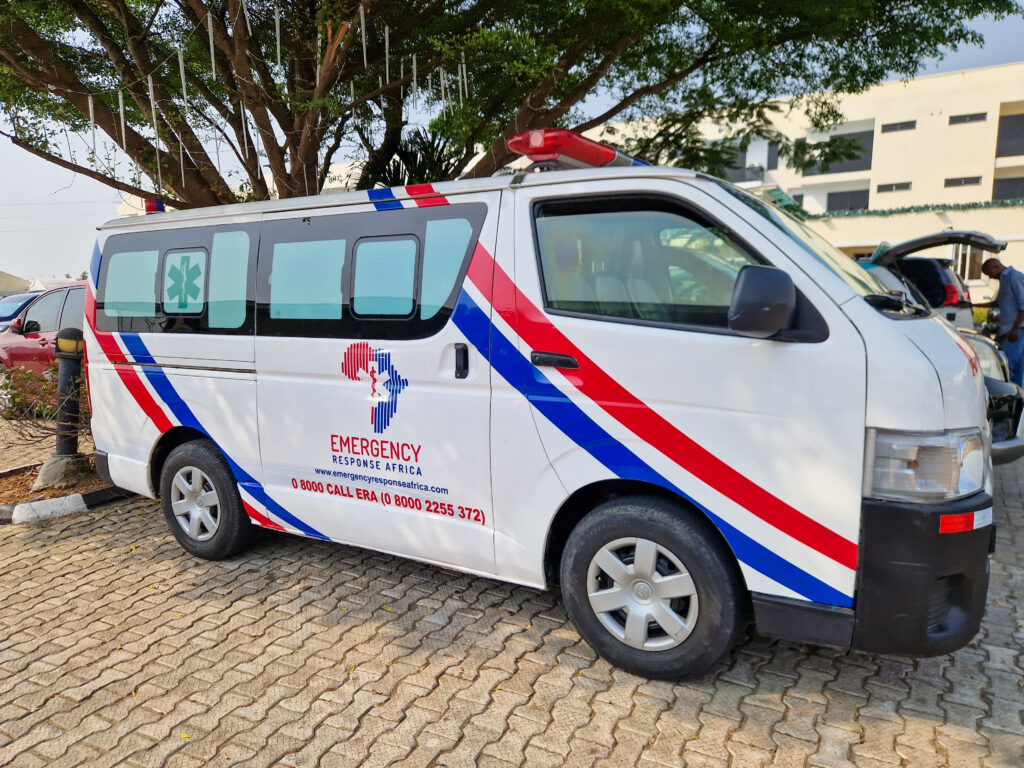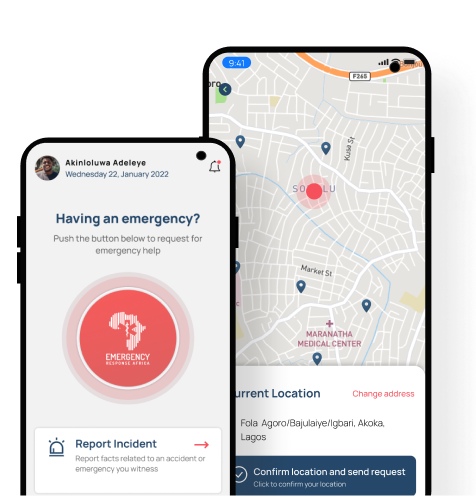Private hospitals now deliver more than 75% of healthcare services in Lagos, often serving as the first point of contact for thousands of medical emergencies every month.
Yet, many of these facilities don’t have their own ambulance service. Lagos is known for heavy traffic, crowded roads, and delays. In this kind of environment, not having a dependable ambulance system can put lives at risk.
From small clinics to medium-sized hospitals, many private healthcare providers are left scrambling during emergencies. Without a structured emergency response plan, some resort to calling ride-hailing apps or depending on relatives to transport patients, options that are risky, unprofessional, and sometimes life-threatening.
In this article, we explore why ambulance partnerships are a necessity for private hospitals in Lagos. We’ll also show how integrating professional ambulance services can help facilities become truly emergency-ready and capable of saving more lives, faster.
1. Enhanced Emergency Response Times
Minutes matter in a medical emergency. For private hospitals in Lagos, ambulance partnerships offer a clear pathway to faster, more reliable response times, something that can be nearly impossible to achieve with ad hoc or informal transport arrangements.
Ambulance service providers like Emergency Response Africa use centralized dispatch systems, GPS tracking, and trained emergency medical responders to ensure patients get care as quickly as possible, even in the face of Lagos’ notorious traffic congestion. These systems allow hospitals to call for help and receive timely updates on the ambulance’s location and estimated time of arrival.
Unlike relying on a taxi or private car, professional ambulance services are designed to prioritize critical care during transit. With sirens, road network coordination, and first responders already providing care en route, ambulance partnerships allow hospitals to initiate treatment before the patient even arrives, shaving off critical minutes and improving outcomes.
2. Improving Patient Stabilization Before Arrival
Faster response is only half the equation, what happens during that journey can determine whether a patient arrives at the hospital alive and in a treatable state. This is where ambulance partnerships offer a critical advantage for private hospitals.
Professional ambulance teams don’t just transport patients, they provide care on the move. Equipped with oxygen, defibrillators, IV fluids, and emergency medications, responders are trained to assess, stabilize, and manage critical symptoms during transit. For conditions like stroke, cardiac arrest, trauma, or severe bleeding, these early interventions can significantly increase a patient’s chance of survival and recovery.
By the time the ambulance reaches the hospital, the patient is not just en route, they’ve already begun receiving care. This continuity ensures that emergency rooms are not starting from zero, but picking up from where trained responders left off. For hospitals aiming to improve outcomes and build trust with patients, this seamless care pathway is invaluable.
3. Reduced Legal and Ethical Risks for Healthcare Providers
When a private hospital handles an emergency without proper transport or trained personnel, the risks go beyond clinical outcomes, they can become legal and ethical issues. If a patient suffers complications or death during an uncoordinated transfer using an unqualified driver or unsafe vehicle, the hospital could be held accountable.
Ambulance partnerships help reduce this risk. By working with licensed providers who follow medical transport protocols, private hospitals can ensure that patient transfers are done professionally and responsibly. This includes proper documentation, continuity of care, and adherence to safety standards, all of which protect the hospital in case of future legal inquiries or complaints.
Ethically, it also reassures patients and families that the hospital is acting in their best interest at all times, even outside its walls. In today’s healthcare environment, doing the right thing, legally and morally is not optional. It’s a critical part of patient-centered care.
4. Cost-Effective Alternative to Building In-House Ambulance Systems
Running a full in-house ambulance system is expensive and complex. It involves buying and maintaining vehicles, hiring trained personnel, securing medical supplies, managing dispatch logistics, and ensuring round-the-clock readiness. For many private hospitals, especially small and mid-sized ones in Lagos, this kind of setup simply isn’t practical.
Ambulance partnerships offer a smarter, more cost-effective solution. Instead of carrying the full financial and operational burden, hospitals can tap into the existing infrastructure of professional ambulance providers. They get the benefits such as rapid response, trained medics, and reliable transport without the overhead costs of owning and managing a fleet.
This arrangement allows hospitals to focus on their core services while still offering emergency support that meets patient expectations. It’s a win-win: better care for patients, and better resource use for healthcare providers.
5. Ambulance Support Helps Reduce Emergency Room Overcrowding
Emergency departments in private hospitals across Lagos are often overwhelmed by the number of patients as well as the type and timing of cases arriving at their doors. Without coordinated ambulance support, many facilities receive patients with no prior notice, no medical history, and no triage, putting pressure on staff and delaying care for those who need it most.
Ambulance partnerships can change that. With professional ambulance services, hospitals receive critical information ahead of time: the nature of the emergency, the patient’s condition, and estimated time of arrival. This allows the emergency room team to prepare, allocate resources, and prioritize appropriately.
In cases where the hospital is already at full capacity, ambulance teams can redirect patients to the nearest facility that’s equipped to handle the emergency, preventing bottlenecks and reducing the risk of avoidable deaths. It’s a smarter, safer way to manage limited emergency care resources in a fast-paced city like Lagos.
6. Better Coordination with Public Health Infrastructure
Private hospitals may run independently, but emergencies don’t follow boundaries. During major incidents like mass accidents, disease outbreaks, or disasters coordination with public health systems becomes essential.
Ambulance partnerships act as a bridge connecting private facilities to central emergency systems, public hospitals, and government response units.
For instance, during large-scale emergencies or disease outbreaks (like COVID-19), private hospitals with established ambulance links can quickly escalate care, transfer critical patients, or coordinate with the Lagos State Emergency Management Agency (LASEMA) more efficiently.
This collaboration improves health system responsiveness at a city-wide level, not just within a single hospital’s walls.
7. Increased Hospital Reputation and Patient Trust
In the private healthcare market, reputation isn’t built on fancy buildings alone, it’s built on how well a hospital responds when lives are at stake. Patients and their families may forget a routine check-up, but they never forget how an emergency was handled.
When a hospital can confidently say, “Help is on the way”, it sends a strong message: this facility is prepared, professional, and cares deeply about its patients. An ambulance partnership reinforces that message. It allows hospitals to offer real-time support, not empty promises, during some of life’s most critical moments.
Over time, this kind of reliability shapes public perception. It becomes part of the hospital’s identity that can feature in patient testimonials, community outreach, and even online reviews.
8. Seamless Integration with Health Insurance and HMOs
The rise in health insurance adoption across Nigeria is reshaping patient expectations. Today, more Lagos residents seek hospitals that align with their HMO or insurance plans not just for consultations and admissions but for emergency care as well. However, many private hospitals still struggle to extend this coverage to ambulance services.
Partnering with ambulance providers who already collaborate with insurance firms and HMOs helps bridge this gap. It allows hospitals to offer fully covered emergency transport, making claims and billing faster, easier, and less stressful for patients and families.
This integration boosts a hospital’s appeal to both insurers and policyholders. Patients are more likely to choose and stay with facilities where their emergencies are handled professionally and covered. For private hospitals, these partnerships open doors to better retention, higher patient satisfaction, and stronger relationships with HMO networks.
Final Thoughts
Emergencies don’t wait and neither should the systems that respond to them. For private hospitals in Lagos, the true test of preparedness isn’t in routine care, but in how well they respond when seconds count.
Ambulance partnerships are critical extension of your commitment to saving lives, protecting your reputation, and delivering the kind of care patients remember and trust.
Emergency Response Africa (ERA) makes it easy to build that system. With real-time ambulance dispatch, trained medical teams, and seamless integration into your existing operations, ERA helps private hospitals become truly emergency-ready.
If your hospital is ready to step up its emergency response, now is the time. Partner with ERA and let’s save lives, together.
FAQs
How Can Hospitals Partner with an Ambulance Service?
To partner, contact the ambulance service directly to discuss your hospital’s needs, service agreements, and integration processes. For instance, you can contact Emergency Response Africa at 08000 2255 372 or email contact@emergencyresponseafrica.com to explore partnership opportunities.
Are Ambulance Services Available 24/7?
Yes, reputable ambulance services operate around the clock, ensuring that emergency medical transportation is available whenever needed. This 24/7 availability is crucial for handling emergencies at any time.
How Quickly Can an Ambulance Reach Hospitals in an Emergency?
Response times vary based on location and traffic conditions. However, established ambulance services like Emergency Response Africa (ERA) utilize GPS tracking and strategic dispatching to ensure rapid response, often reaching patients within 20 minutes in Lagos.
Can Ambulance Services Integrate with Existing Hospital Systems?
Many ambulance providers offer integration with hospital systems, allowing for seamless communication, patient data sharing, and coordinated care. This ensures that the hospital is prepared for the patient’s arrival and can provide immediate care.
Can Ambulance Services Handle Specialized Transfers, Such as Neonatal or Cardiac Patients?
Many ambulance services are equipped to handle specialized transfers, including neonatal, cardiac, or trauma patients. They have the necessary equipment and trained personnel to manage specific medical needs during transit.



